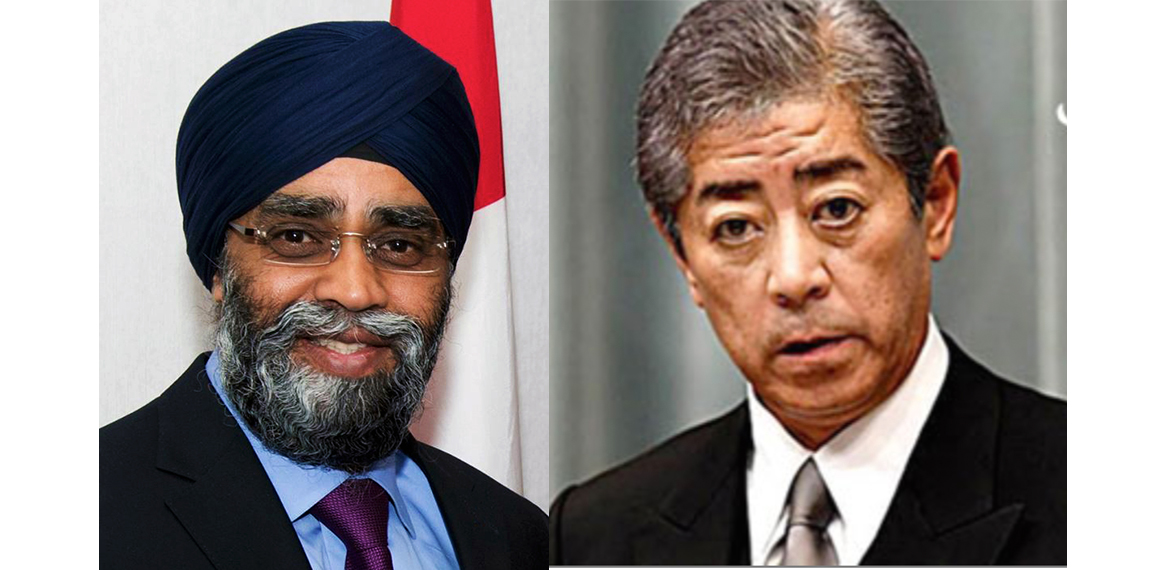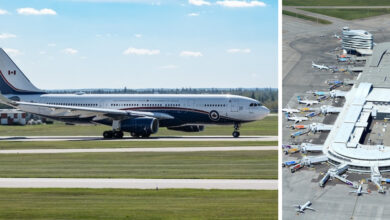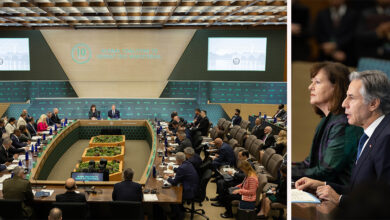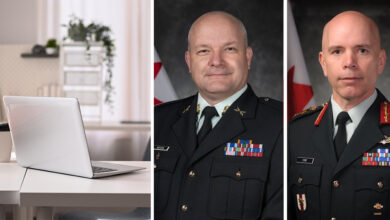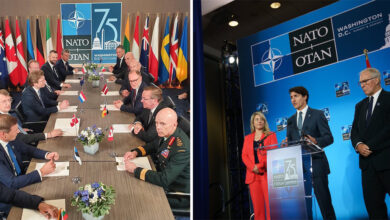Today’s News
Canada and Japan’s Ministers of Defence hold bilateral meeting
On Monday the Ministry of Defense of Japan and the Department of National Defence of Canada issued the following joint statement:
The Minister of National Defence of Canada, Harjit Singh Sajjan, and the Minister of Defense of Japan, Takeshi Iwaya, held a bilateral meeting on June 3rd, 2019 in Tokyo.
The Ministers welcomed the progress made in bilateral defense cooperation and exchanges under the Canada-Japan Joint Declaration on Political, Peace and Security Cooperation signed in 2010, highlighting outstanding achievements in bilateral defense cooperation over the last several years.
The Ministers, emphasizing the significance of the Acquisition and Cross-Servicing Agreement (ACSA) signed last year, affirmed their intention to raise the bilateral defense relationship to a new level in this year of the 90th anniversary of the Canada-Japan diplomatic relations.
The Ministers highlighted the following three noticeable developments in recent years and concurred on cooperatively advancing a free and open Indo-Pacific, supported by an inclusive and revitalized rules-based international order.
- The Prime Ministers of Canada and Japan, in April 2019, welcomed the strengthened bilateral relations both in security and economic fields, and re-affirmed their commitment to strengthen the strategic partnership between Canada and Japan, and discussed their shared vision for maintaining a free and open Indo-Pacific region.
- Japan’s National Defense Program Guidelines issued last December stated Japan’s intention to promote efforts including joint training and exercises as well as bilateral collaboration on third-party engagement with Canada.
- Canada’s Defense Policy issued in 2017 emphasized Canada’s commitment to strengthen the presence and engagements in the Asia-Pacific region.
In order to support their shared vision for a free and open Indo-Pacific, the Ministers confirmed their intention to share strategic viewpoints and to seek bilateral defense cooperation on third-party engagement, including through capacity building and training initiatives in close collaboration with third countries.
Defense Cooperation and Exchanges
Welcoming that the close co-operation between Canadian Armed Forces (CAF) and Japan Self-Defense Forces (JSDF) will be further accelerated by the ACSA coming into force following recent completion of both countries’ domestic procedures for the conclusion of ACSA, the Ministers confirmed their commitment to elevating defense cooperation to the next level in the following areas:
-
Peacekeeping
The Ministers welcomed advancements in the cooperative relationship in the area of peacekeeping by mutually dispatching personnel to each country’s training courses.
Moreover, the Ministers welcomed further progress of the cooperative relationship through reciprocal exchanges of personnel in both countries’ capacity building initiatives, including:
- The JSDF participation as a lecturer on Canada’s Military Training Cooperation Program (MTCP) Strategic Peace Support Operations Course in Indonesia in August 2018 and as an observer on the MTCP Women, Peace and Security Course in Malaysia in January 2019
- CAF personnel as observers on a Japanese engineering-focused capacity building assistance course in Mongolia in August 2018.
The Ministers expressed their serious concerns regarding the situation in the East and South China Seas, and strongly opposed unilateral actions that could escalate tensions and undermine regional stability and the rules-based maritime order, including the militarization of disputed features in the South China Sea.
In order to further deepen Canada-Japan bilateral defense relations in peacekeeping, the Ministers announced their shared intention to advance co-operation in engaging with third countries.
Both Ministers affirmed to coordinate and explore the possibility of reciprocal cooperation in capacity building initiatives through Canada’s MTCP program and Japan’s related programs in close collaboration with third countries.
The Ministers further expressed their intention to explore areas for cooperation regarding the United Nations Project for Rapid Deployment of Enabling Capabilities, which Japan has contributed to.
2) Joint Training and Unit-to-unit Exchanges
Exchanges between the Japan Maritime Self-Defense Force and the Royal Canadian Navy
The Ministers welcomed the increase and advancement of bilateral training between the naval components, exemplified by the regular bilateral training “KAEDEX” since 2017 and Canada’s first participation in last year’s Japan-U.S. bilateral exercise “Keen Sword 2019”. Minister Iwaya also welcomed the port call made by the Royal Canadian Navy (RCN)’s submarine in 2017 in Japan for the first time in approximately 50 years, as well as regular port calls made by the RCN’s frigates.
The Ministers affirmed the significance of showing the presence by both naval components in the Indo-Pacific region as it contributes to a free and open maritime order based on the rule of law, and underlined their intention to continue bilateral training, taking advantage of the opportunities when RCN vessels are deployed in this region. The Ministers confirmed their intention also to work together with ASEAN and other countries in this endeavour.
Exchanges between the Japan Air Self-Defense Force and the Royal Canadian Air Force
Noting that the Japan Air Self-Defense Force (JASDF) visited Canada and conducted unit-to-unit exchanges with the Royal Canadian Air Force (RCAF) twice in 2018, the Ministers affirmed to continue air-to-air exchanges through visits of both countries’ air assets to each other’s air bases. They also shared the intention to seek possibilities for conducting joint training in the future.
Exchanges between the Japan Ground Self-Defense Force and the Canadian Army
The Ministers expressed their intention to explore possibilities for further exchanges on peacekeeping between both countries’ respective ground components as the CAF has significant experience and knowledge in this area.
Talks between Japan Self-Defense Forces and Canadian Armed Forces
The Ministers confirmed the importance of holding regular talks including CAF/JSDF Joint Staff Talks, Naval Talks, and Air Force Talks. They especially commended the fact that the CAF/JSDF Joint Staff Talks were held for the first time in 13 years this May. Both Ministers committed to holding these talks more frequently in the future.
3) Humanitarian Assistance/ Disaster Relief (HA/DR)
Noting that the Memorandum of Cooperation between the Government of Canada and the Government of Japan on Standard Operating Procedures in Support of Humanitarian Assistance and Disaster Relief (HA/DR) Missions was made in 2009, and that there is a high likelihood that both our nations will again be called upon to respond to natural or man-made disasters in the future, the Ministers recognized that Canada and Japan have a ground for cooperation in the HA/DR domain.
Based on this recognition, the Ministers reiterated the importance of enhancing both countries’ response mechanisms through close collaboration and exchange of best practices.
The Ministers committed to seeking opportunities for training to promote co-operation during international disaster relief operations, which may include observerships or participation in large scale exercises.
4) Education and Research Exchanges
The Ministers emphasized the significance of fostering a common strategic viewpoint on the security environment of the Indo-Pacific region, utilizing security forums to be held in both countries including Canada-Japan Symposium for Peace and Security Cooperation and Halifax International Security Forum, among others.
The Ministers welcomed the regular exchange of students and researchers between the defense educational and research institutions of the two countries and committed to continue those exchanges.
The Ministers emphasized the significance of fostering a common strategic viewpoint on the security environment of the Indo-Pacific region, utilizing security forums to be held in both countries including Canada-Japan Symposium for Peace and Security Cooperation and Halifax International Security Forum, among others.
5) High-Level Dialogues and Mutual Visits
The Ministers expressed their intention to hold political and strategic defense talks regularly at the ministerial level by taking advantage of opportunities such as international security forums such as the IISS Shangri-La Dialogue and mutual visits. They also reaffirmed to continue to hold Canada-Japan Foreign and Defense Vice-Ministerial Meeting (“2+2”).
Regional Issues
The Ministers confirmed their commitment to the complete, verifiable, and irreversible dismantlement of all of North Korea’s weapons of mass destruction and ballistic missiles of all ranges, in accordance with the relevant United Nations Security Council resolutions (UNSCRs).
They also exchanged their views on the recent short-range ballistic missile launches by North Korea, and confirmed that their defense authorities would remain vigilant. The Ministers shared the view that North Korea continues to violate UNSCRs, and for the full implementation of UNSCRs, they reaffirmed their intention to work together to address the evasion of the sanctions by North Korea, including illicit ship-to-ship transfers involving North Korean-flagged vessels.
Minister Sajjan reiterated Canada’s decision to renew its participation in a multinational initiative to counter illicit maritime activities prohibited by UNSCRs through Canada’s recently approved Operation NEON, under which Canada will periodically deploy Canadian Armed Forces (CAF) ships, aircraft, and personnel over the next two years. Minister Iwaya welcomed this continued contribution by the CAF.
The Ministers expressed their serious concerns regarding the situation in the East and South China Seas, and strongly opposed unilateral actions that could escalate tensions and undermine regional stability and the rules-based maritime order, including the militarization of disputed features in the South China Sea.
They also reaffirmed the significance of pursuing demilitarization and self-restraint, the freedom of navigation and overflight, as well as the peaceful resolution of disputes according to relevant international law, including the UN Convention on the Law of the Sea (UNCLOS).
The Ministers called for the complete and effective implementation of the Declaration on the Conduct of Parties in the South China Sea (DOC), and underlined that the Code of Conduct (COC) should be consistent with international law including the UNCLOS and should not prejudice the rights of countries which are not involved in the COC negotiation.
The Ministers instructed their respective officials to work together to promote the defense cooperation in the above-stated areas and concluded the bilateral meeting.



